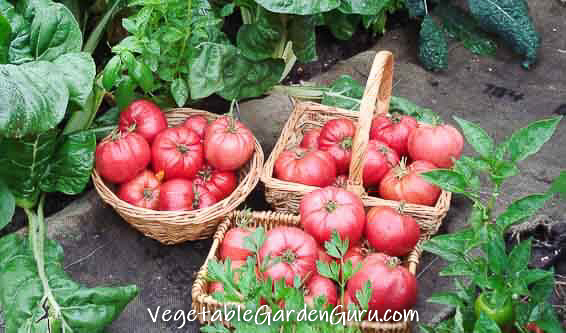| Back to Back Issues Page |
 |
|
Under the Arbor: Issue 16 May 21, 2021 |
May 2021 Issue 16In This Issue:
How to Get Crazy Yields from Tomatoes!
How to Get Crazy Yields from Tomatoes!Fresh, real tomatoes are the number one reason why most gardeners garden. Even in a pot on a balcony, a homegrown tomato growing in healthy soil can taste out of this world, quite unlike anything you can buy in a supermarket anywhere.
To achieve maximum yield (and flavor, which tracks with nutrition), there are a number of things you can optimize.
Variety For heirlooms, the best source I've ever found for both information and seeds is Gary Ibsen's Tomato Fest catalog. He offers an amazing selection of heirloom tomato seeds (650 varieties!) with great photos and descriptions, as well as curated collections that allow you to try out some of the most popular varieties for yourself. If you are interested in disease-resistant varieties of hybrids, check out Johnny's Selected Seeds , where you can use a filter to sort for varieties by disease resistance, heat tolerance and other factors. Soil Health Air Temperature If you live where summer temps are consistently in the 90s, see if you can find a spot to plant your tomatoes that gets sun until early afternoon and then some filtered shade, such as near the edge of a tree. Another option is to cover them with row cover like Reemay or Agribon, which will cut out about 10% of the light, which is less than shade cloth but because of its much lighter weight can be draped right over the plants. If you're a serious tomato fan and live in the desert or jungle, you can build a portable shade structure out of 2x4s, PVC pipe, or even a hoop tunnel made of bent electrical metal conduit covered with shade cloth. Be sure the ends are open to let wind and bees in. (Johnny's sells a tool for bending EMC.) Pollination To read more tips on boosting tomato yield, click
here.
7 Ways Vegetable Gardening Boosts Your Immune SystemWe've probably all seen the sign/tee shirt: "Gardening is Cheaper Than Therapy, and You Get Tomatoes!", but there is more to the story than the chuckle.There are at least seven different reasons why the simple act of growing a vegetable garden builds a healthy immune system, as well as bolsters your mental health. Boosts your vitamin D levels Relieves stress and lowers your inflammatory cortisol levels But a sustained high cortisol level is dangerous and is not good as a long-term, at-the-office, fear of judgement/loss, marital-strife, chronic-competition strategy. In the modern world, many of us have chronically high cortisol levels, and working in the garden facilitates dropping cortisol levels back down to normal. Is "grounding" when you go barefoot A Healthline article published April 16, 2019 says "A 2011 publication reported four different experiments examining grounding and its effect on human physiology. Electrolytes, thyroid hormone levels, glucose levels, and even immune response to immunizations improved with grounding." Provides a sense of empowerment and accomplishment Immerses you in beauty, enhancing a sense of well-being |
| Back to Back Issues Page |